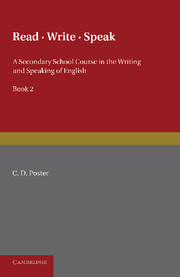Book contents
- Frontmatter
- Acknowledgements
- The Storyteller
- A Journey by Road
- Open Your Eyes
- ‘Telegram for You’
- Adventures with Animals
- Dead Man's Chest
- Wanted by the Police
- The Professor
- Take a Look at Yourself
- Among the Giants
- Disaster!
- Those Were The Days!
- Looking about you
- Moving Day
- News… and Views?
- Advertisements
Advertisements
Published online by Cambridge University Press: 05 June 2016
- Frontmatter
- Acknowledgements
- The Storyteller
- A Journey by Road
- Open Your Eyes
- ‘Telegram for You’
- Adventures with Animals
- Dead Man's Chest
- Wanted by the Police
- The Professor
- Take a Look at Yourself
- Among the Giants
- Disaster!
- Those Were The Days!
- Looking about you
- Moving Day
- News… and Views?
- Advertisements
Summary
What a wonderful world we live in—if one were to believe everything that appears in print. For a few shillings spent on this lipstick or that foundation cream every girl can be beautiful, no matter how plain nature has intended her to be. One haircream makes all the girls swarm about this boy (you know it must be true because there's a picture to prove it!) and another shampoo makes all the boys swarm about this girl. What, I wonder, would happen if all the boys used the haircream and all the girls the shampoo? Who would be swarming where? The latest electric cooker, refrigerator, or washing machine is only 79 guineas, and those who cannot afford this can pay in easy instalments. Its operation is so simple that a child can work it. Everybody who matters has one. It is essential to the modern home.
Now there is nothing wrong with advertising itself. We want to know what a manufacturer has to sell, we ought to know before we buy it what it will do, and we must know what it will cost to buy, and, often, to run. Equally there is nothing wrong with the words only, easy, essential, modern, and so on. There is something wrong, however, in the abuse of words, and these words and many others can be abused in advertisements.
A. Let us first examine the word essential. What does it mean? Now make a list of the apparatus and equipment that is essential for a kitchen for, say, a young married couple without children. It is possible, of course, to cook your food on a stick over an open fire, but I am not suggesting that we should return to primitive conditions. When you have discussed and agreed this list of kitchen essentials, make a second list of items of equipment that are regularly advertised with the suggestion that no housewife should be without them. If these are not in fact essential, are they desirable? Are they economical? labour-saving? time-saving? Do they contribute to the health or peace of mind of the housewife? Discuss each in turn.
Information
- Type
- Chapter
- Information
- Read Write Speak , pp. 132 - 136Publisher: Cambridge University PressPrint publication year: 2013
